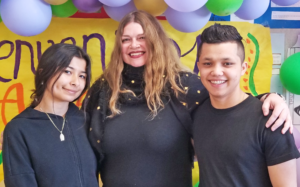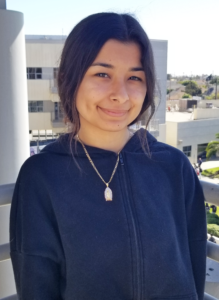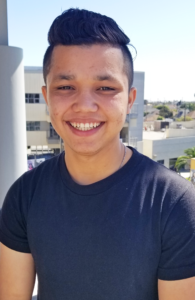Recently we sat down with two seniors from Santee Education Complex: Denise Calderon and Emerson Majano. They are peer mentors to younger students as part of a peer mentorship program spearheaded by Dr. Claudia Cataldo (Teacher PROfile). Here they share the impact the program has had on their lives.

L to R: Denise, Dr. Cataldo, and Emerson pose with their recent Mardi Gras celebration banner. New banners are created each month for celebrations put on by the program.
How has this mentorship program helped you at school – academically and/or socially?

Denise: I never really cared for how I was perceived by others at school until I joined our mentorship program. I feel it is my responsibility to lead by example so that my mentee understands the importance of attending school and doing well in school. My mentee is a freshman at Santee and she comes from Guatemala. Most of the mentees in the program are from Central America. My mentee and I have developed a strong connection with each other. I have helped her to voice her opinions and ask for help when she needs it. She’s like my ‘little sister,’ so I look out for her. We plan things ahead and have clear and open communication to help her confidence. I feel that both of our attendance rates have gone up since being paired with each other.
I’ve seen that long-lasting friendships are created in this program. We’re all interconnected. If one mentor is absent or unable to support on the day that we meet, other mentors step in. We all get to connect on deep, personal levels. Dr. Cataldo and others who support the program don’t tell us what to do or how to do it. We are able to have relaxed and honest conversations with each other because our every move isn’t being monitored. This allows mentors and mentees to have confidential conversations that build trust. We’re not being forced to be a part of the program or forced to socialize. We open up to each other and share our experiences because, even though they are different, we connect and empathize based on struggles we face. We just know that we’ve all been through tough times and we support one another. I have learned to be more vulnerable and that’s true for most of the program participants.
Being a part of this program has positively changed my perspective of school and I’m proud of myself for being on-track to graduate. It’s also bittersweet because I’ll be leaving this program in June. I’m confident that I will be in touch with my mentee since I’ve built such a strong relationship with her. In looking back, I want her to know how far we’ve come and for her to say “look how far I’VE come.”
And for you Emerson, how has this mentorship program helped you?

Emerson: When I came to Santee from Honduras I couldn’t speak English and students made fun of me. It was embarrassing. As soon as I started learning I wanted to help others who were experiencing similar situations and motivate them to move past embarrassing comments. Through this program, I’ve gained an immense amount of confidence. I’m able to more easily provide support to my mentee to make him feel comfortable in our school environment. I feel I have accomplished a lot during my time at Santee. Although I’ll be graduating in June, I’m happy to have planted the seed in other students to steer them in the right direction.
Trust is a very important factor in our program. As mentors, we are often asked by mentees if we tell any adults what we talk about. Dr. Cataldo made it very clear at the beginning that it’s up to us to figure out the best way to help them. I constantly remind our mentees that this is a safe, confidential, no-judgment zone. It took me a month of regular communication for my mentee to talk to me more openly. He was very closed off, was short with his responses, and didn’t trust anyone. He traveled here from Mexico and he had a distressing journey. After being in the program with peers who faced some of the same challenges, my mentee is now socializing and getting “As” and one “B” in his classes. He’s happy here. I’m so proud of him and the progress he is making.
Something I’ve noticed with our mentees is their desire for more cultural connections. They miss home. And many have mentioned how they never celebrated holidays or attended social gatherings because their families couldn’t afford it. Through the program, we put on monthly celebrations to show all new international students some of the big holidays that are celebrated here, which in turn improves their social skills and promotes awareness of the need for the program. It also serves as a little reminder that their culture is still very present in this new home through food, music, and conversations. I’ve seen some of us become overwhelmed by emotions because of the connections we make. Interestingly enough, because I’m Honduran, many of the new students from Central America come to me for advice. I suppose there’s a level of comfort in knowing that there is cultural familiarity.
